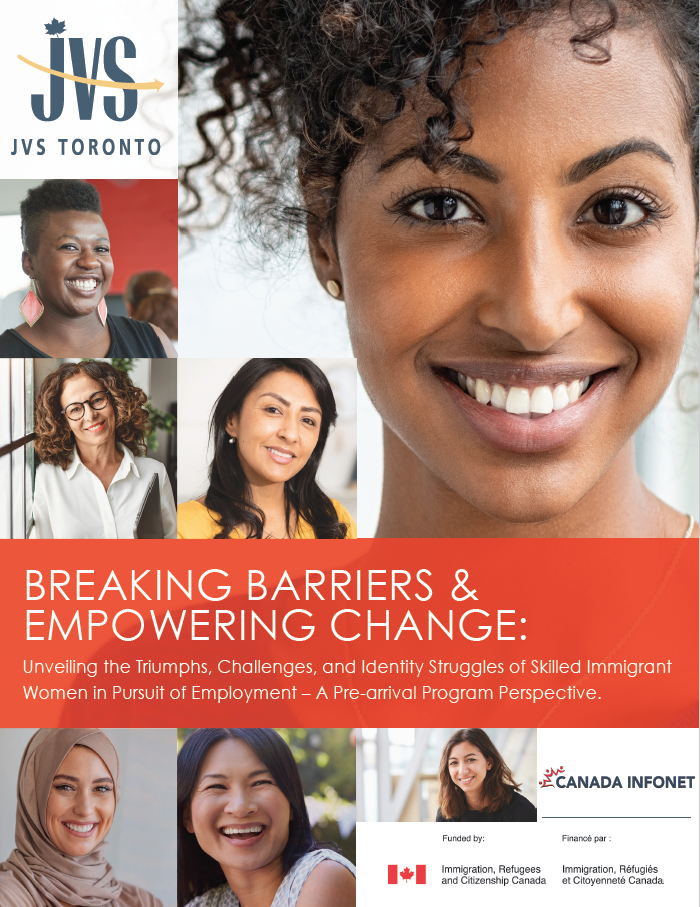 In the rich tapestry of immigrant experiences, the narratives of skilled immigrant women often stand out for their resilience, ambition, and the unique challenges they face. A recent research report conducted by JVS Toronto in 2023, titled “Breaking Barriers and Empowering Change: Unveiling the Triumphs, Challenges, and Identity Struggles of Skilled Immigrant Women in Pursuit of Employment,” delves deep into the lives of women-identified participants of JVS Toronto’s Canada InfoNet pre-arrival program, shedding light on their journeys, hurdles, and remarkable successes. The research is based on survey and focus group data, of women who participated in the program from 2020 to 2022.
In the rich tapestry of immigrant experiences, the narratives of skilled immigrant women often stand out for their resilience, ambition, and the unique challenges they face. A recent research report conducted by JVS Toronto in 2023, titled “Breaking Barriers and Empowering Change: Unveiling the Triumphs, Challenges, and Identity Struggles of Skilled Immigrant Women in Pursuit of Employment,” delves deep into the lives of women-identified participants of JVS Toronto’s Canada InfoNet pre-arrival program, shedding light on their journeys, hurdles, and remarkable successes. The research is based on survey and focus group data, of women who participated in the program from 2020 to 2022.
Here are some of the highlights of the study:
Barriers to Employment
The study uncovers the multifaceted challenges immigrant women encounter in their quest for employment in Canada. Notably, the lack of Canadian work experience emerges as a significant barrier, with 44.9% of respondents citing it as a major hurdle. Additionally, navigating regulated professions and balancing family responsibilities pose formidable challenges. The report reveals how childcare availability affects job searches and underscores the complex interplay between motherhood and career aspirations.
Pre-Arrival Success
Despite these obstacles, skilled immigrant women who receive support from pre-arrival programs like Canada InfoNet have better employment outcomes upon arrival in Canada even though they continue to face systemic barriers when compared to other groups. An overwhelming 82% of these women found employment within six months of arrival, a testament to the efficacy of such initiatives. Their proactive approach to job searching, often commencing before setting foot in Canada, speaks volumes about their determination and preparedness.
Navigating Career Changes and Identity
For some immigrant women, the journey involves significant career transitions, either due to regulated professions or the need for reinvention in a new environment. 29.5% of respondents grapple with navigating regulated professions, while an additional 44.8% find themselves charting new career trajectories in unfamiliar industries. The report highlights the emotional toll of such changes, as many grapple with a loss of identity tied to their previous occupations. For these women, the level of job satisfaction varied with the ones reporting lower satisfaction also reporting a significant loss in self-esteem. The connection between their sense of identity and sense of self was closely tied to their occupational identity. The report also shows how making this decision before arriving in Canada as a result of one’s own choice leads to a stronger identification with their new career and are more likely to consider that a permanent change. Yet, amidst the challenges, there’s a sense of empowerment as these women forge new paths and redefine success on their own terms.
Recommendations for Empowerment
The report also offers actionable recommendations for empowering immigrant women. It calls for gender-sensitive support systems tailored to the unique needs of female immigrants, especially those with children. Integrating settlement, employment, and childcare services could streamline their integration into the workforce. It also emphasizes the importance of mental health support, particularly in the wake of the isolation experienced by remote workers.
In the stories of skilled immigrant women, we find narratives of resilience, determination, and self-discovery. Despite facing formidable barriers, these women exhibit unwavering courage and adaptability. As we reflect on their journeys, it is imperative not only to recognize their triumphs but also to amplify their voices and provide targeted support.
By empowering immigrant women, we enrich our communities, foster diversity, and propel collective progress towards a more inclusive society.
Download the report here



